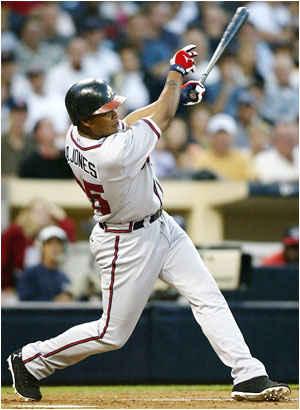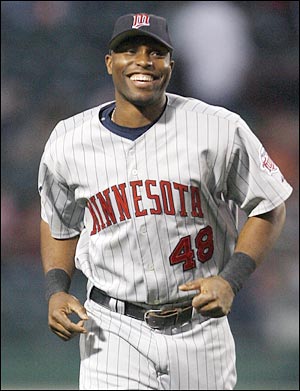« Archive for November, 2007
posted by
Shawn, on November 30th, 2007 at 08:27 am, in category
Uncategorized
Next time you read that X player’s contribution in Y year was worth $Z million, ignore it.
There’s been a great deal of research into valuing players based on performance, from academics, bloggers, academic bloggers, and a whole host of others. The goal is to determine a player’s marginal revenue product (MRP) to his team; in essence, how much money is he really worth?
But this doesn’t work. Or at least, it hasn’t worked yet, in the public domain of baseball research. Yes, it is certainly possible, but it is much more complex than most would have you think.
In sports economics classes around the country, teachers generally present MRP as a simple function of marginal revenue per team win, and wins added by the player. Many popular systems around the blogosphere do the same. And as an extremely simplistic indicator, the resulting numbers more or less pass the laugh test. […]
posted by
Shawn, on November 28th, 2007 at 08:04 am, in category
Uncategorized
 On Monday, we presented a simple, unscientific way of evaluating free agent signings within baseball’s current economic landscape. To recap, we put each deal through five quick tests:
On Monday, we presented a simple, unscientific way of evaluating free agent signings within baseball’s current economic landscape. To recap, we put each deal through five quick tests:
- Is this player likely to make his team significantly better in 2008?
- Is this player’s performance likely to hold up at a reasonable level through the life of the contract?
- Could the team have found the same level of performance in 2008 at a lower price? […]
posted by
Shawn, on November 26th, 2007 at 08:12 am, in category
Uncategorized
 With baseball’s revenues soaring, we figured this year’s free agents would do very well for themselves on the open market. And, well, we were right. But how can we put these numbers into context?
With baseball’s revenues soaring, we figured this year’s free agents would do very well for themselves on the open market. And, well, we were right. But how can we put these numbers into context?
Over the past couple winters, analysts have repeatedly pounded teams for throwing multi-year, huge-money contracts at supposedly undeserving players. But this criticism hasn’t always been valid. Derek Lowe’s four year, $36 million deal, vilified at the time, actually looks incredibly prudent three seasons in. […]
posted by
Shawn, on November 21st, 2007 at 08:06 am, in category
Uncategorized
Let’s get right to it:
- Warren Buffett is right and wrong. It’s true that baseball teams don’t make the kind of income an investor would normally expect from similarly valued companies. They are also terribly unpredictable businesses, largely dependent on the team’s success. However, as I’ve written a number of times, baseball owners make their money on capital gains, not operating profits. With a perpetually limited supply, franchise values will almost never go down in the long run. It’s a different kind of business, but certainly not a bad one. […]
posted by
Shawn, on November 20th, 2007 at 08:22 am, in category
Uncategorized
 Major League Baseball is officially knocking on the NFL’s door. A losing business just five years ago, baseball has turned it around in a big way, pulling far ahead of the NBA and quickly approaching the National Football League for American sports supremacy.
Major League Baseball is officially knocking on the NFL’s door. A losing business just five years ago, baseball has turned it around in a big way, pulling far ahead of the NBA and quickly approaching the National Football League for American sports supremacy.
Shocking as all that is, it is the way they’ve done it that is most astounding. Historically, no sport (and perhaps no other business) in this country has been as resistant to change as Major League Baseball. New revenues used to simply mean new customers; creatively was lacking, to say the least. Several times, the owners shot themselves in the foot (or came close) because of a lack of foresight, banning local radio and television broadcasts in the early days of those mediums, and refusing to even acknowledge Peter Seitz as he was about to change their business models forever. […]
posted by
Shawn, on November 15th, 2007 at 07:41 am, in category
Uncategorized
In a week or two from now, we may know the full details of this apparent about face that both the Yankees and Alex Rodriguez have now done. 
The story goes as follows, at least if you are to believe the New York Daily News: A-Rod contacted the Yankees, hoping that they would consider talking to him. The Yankees agreed, on the conditions that A-Rod take a “below market” contract, and Scott Boras would be kept out of the negotiations. Willing to do anything to be a Yankee, A-Rod agreed, and a deal is imminent.
Now consider the source. The paper cited an anonymous “high-ranking” Yankee official, which almost always means an anonymous Steinbrenner (although that anonymous Steinbrenner is likely a bit younger this time). The Yankees are clearly trying to shape this story in a way that suits them, and certain grumpy writers are buying it. […]
posted by
Mike, on November 14th, 2007 at 03:26 pm, in category
Uncategorized
The 2008 CHONE hitter projections have arrived, which is pretty exciting news since this system is one of the best ones out there.
Let’s get right into it. Top five projected hitters by wOBA:
- Albert Pujols, .437
- Barry Bonds, .434
- Alex Rodriguez, .431
- David Ortiz, .431
- Miguel Cabrera, .420
How about some free agent projections: […]
posted by
Shawn, on November 13th, 2007 at 08:38 am, in category
Uncategorized
Prediction: the New York Yankees will soon be a very profitable business.
 Over the last four seasons, according to Forbes, the Yankees have lost $26 million, $37 million, $50 million, and $25 million, respectively. Those were the worst operating margins in the sport in every year but 2003 (behind only A-Rod’s Rangers), and they were the only team to be in the red in 2006.
Over the last four seasons, according to Forbes, the Yankees have lost $26 million, $37 million, $50 million, and $25 million, respectively. Those were the worst operating margins in the sport in every year but 2003 (behind only A-Rod’s Rangers), and they were the only team to be in the red in 2006.
Now remember, we have to take these numbers with a whole chunk of salt. Almost every franchise has one subsidiary or another in which they can conveniently hide revenues for tax purposes. The Yankees have one of the better shelters around, in the YES Network. […]
posted by
Shawn, on November 9th, 2007 at 12:07 pm, in category
Uncategorized
I’m pretty fascinated by issues that have no real significance, and yet still generate a great deal of interest. Does it matter if Lindsay Lohan goes to rehab? Or if Paris Hilton and Britney Spears are no longer friends? It matters to them, I guess, but logically it shouldn’t matter to anybody else. These are media-driven fascinations. People like to read about drama, particularly when it’s not their own. Far more people will be interested if Brad Pitt and Angelina Jolie broke up than if they had another baby.
Baseball’s steroids issue is in this class of news. It is a media-driven story, only interesting because people love train wrecks. In reality, steroids have had no discernible effect on baseball’s business, nor will they. […]
posted by
Shawn, on November 6th, 2007 at 08:31 am, in category
Uncategorized
I don’t like writing about ethics. It’s a gray area, without many defined parameters, and that doesn’t suit my numbers-oriented brain.
But if you understand the history of baseball, and particularly that of the relations between teams and players, it is difficult not to take the players’ side on most issues. As Jim Bouton once said, “For a hundred years the owners screwed the players. For 25 years the players have screwed the owners - they’ve got 75 years to go.”
Major League Baseball teams are businesses, and act accordingly. While they have not always been well run businesses, they are, in fact, profit-seeking companies, and shouldn’t be treated any differently. […]
 On
On  With baseball’s revenues soaring,
With baseball’s revenues soaring,  Major League Baseball is
Major League Baseball is 
 Over the last four seasons, according to
Over the last four seasons, according to